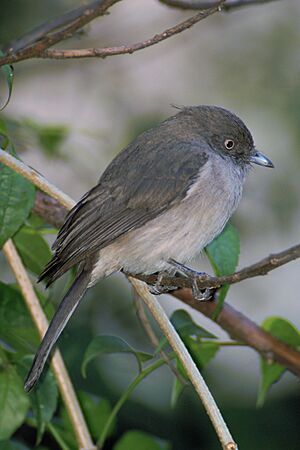Abyssinian slaty flycatcher facts for kids
Quick facts for kids Abyssinian slaty flycatcher |
|
|---|---|
 |
|
| Photo taken in Addis Ababa | |
| Conservation status | |
| Scientific classification | |
| Synonyms | |
|
The Abyssinian slaty flycatcher (scientific name: Melaenornis chocolatinus) is a cool bird found in Africa. People sometimes call it the Abyssinian flycatcher, Abyssinian black flycatcher, or Abyssinian chocolate flycatcher. It belongs to a bird family called Old World flycatchers. You can find this bird mainly in Eritrea and Ethiopia.
Contents
About the Abyssinian Slaty Flycatcher
This bird is mostly a dull grey-brown color. It usually sits upright, just like other Old World flycatchers. It has bright yellow eyes that stand out against its plain brownish face. The top part of its body is a dark, sooty brown. Its belly and chest are a lighter buff-brown.
The Abyssinian slaty flycatcher is about 15–16 cm (5.9–6.3 in) long. That's about the length of a pen! It weighs around 20–25 g (0.71–0.88 oz). This is about the same weight as a few coins.
What Does it Sound Like?
This bird makes different "tseep" sounds. When it's worried or senses danger, it lets out a harsh, chattering alarm call.
Where It Lives
The Abyssinian slaty flycatcher lives in parts of Africa. It is found in Eritrea and Ethiopia. Scientists have identified two main types, or subspecies, of this bird:
- Melaenornis chocolatinus chocolatinus: This type lives in central Eritrea and the northern and central parts of Ethiopia.
- Melaenornis chocolatinus reichenowi: This type is found in western Ethiopia.
Its Home and Habitat
You can find the Abyssinian slaty flycatcher in different places. It likes forests that are at medium to high altitudes. It also lives at the edges of woodlands and in clearings. Sometimes, you can spot it in farmland areas. It even lives in towns and cities, especially in big gardens and parks.
How It Lives and Hunts
The Abyssinian slaty flycatcher is a skilled hunter. It hunts in a typical "flycatcher" way. It waits on a branch, then quickly flies out to catch insects in the air. It's very good at snatching bugs right out of the sky!
Scientists believe these birds lay their eggs in Ethiopia during January to February and again from March to June. The nest is shaped like a cup. It's usually built in a narrow fork of a tree branch that sticks out horizontally. A female bird typically lays three eggs. These eggs are blue-grey and have blotchy marks on them.
Categories


